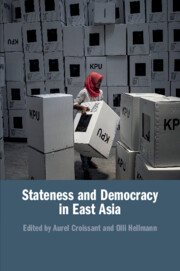Book contents
- Stateness and Democracy in East Asia
- Stateness and Democracy in East Asia
- Copyright page
- Contents
- Figures
- Tables
- Contributors
- Acknowledgements
- 1 Introduction: Rethinking Stateness and Democracy in East Asia
- 2 State-Building and Democratization
- 3 South Korea’s Democracy and the Legacies of the Developmental State
- 4 After Hegemony: State Capacity, the Quality of Democracy and the Legacies of the Party-State in Democratic Taiwan
- 5 Democratization Interrupted: The Parallel State and the Demise of Democracy in Thailand
- 6 Weak State and the Limits of Democratization in Cambodia, 1993–2017
- 7 The Institutional Roots of Defective Democracy in the Philippines
- 8 Stateness and State Capacity in Post-Authoritarian Indonesia: Securing Democracy’s Survival, Entrenching Its Low Quality
- 9 As Good as It Gets? Stateness and Democracy in East Timor
- 10 Stateness and Democracy: Evidence from East Asia and Cross-Regional Comparisons
- Index
- References
5 - Democratization Interrupted: The Parallel State and the Demise of Democracy in Thailand
Published online by Cambridge University Press: 13 May 2020
- Stateness and Democracy in East Asia
- Stateness and Democracy in East Asia
- Copyright page
- Contents
- Figures
- Tables
- Contributors
- Acknowledgements
- 1 Introduction: Rethinking Stateness and Democracy in East Asia
- 2 State-Building and Democratization
- 3 South Korea’s Democracy and the Legacies of the Developmental State
- 4 After Hegemony: State Capacity, the Quality of Democracy and the Legacies of the Party-State in Democratic Taiwan
- 5 Democratization Interrupted: The Parallel State and the Demise of Democracy in Thailand
- 6 Weak State and the Limits of Democratization in Cambodia, 1993–2017
- 7 The Institutional Roots of Defective Democracy in the Philippines
- 8 Stateness and State Capacity in Post-Authoritarian Indonesia: Securing Democracy’s Survival, Entrenching Its Low Quality
- 9 As Good as It Gets? Stateness and Democracy in East Timor
- 10 Stateness and Democracy: Evidence from East Asia and Cross-Regional Comparisons
- Index
- References
Summary
What is the relationship between well-developed stateness and democracy that continuously collapses or fails to consolidate? This chapter examines this question by scrutinizing the case of Thailand. It argues that a historically entrenched alliance of authoritarian actors, having long guided state-building efforts, guaranteed a high level of state capacity across the country. After 1980, these authoritarian actors asserted themselves behind the guise of a monarch-led ‘parallel state’, which dominated Thailand indirectly and was unwilling to surrender power to democratic actors. When these authoritarian actors felt that their interests were becoming threatened by elected governments, they plotted their overthrow, resulting in a vicious cycle of coups, which prevented high-quality democracy from ever developing. Following democratization in 1992, state capacity remained relatively high compared to other ‘new democracies’ in Southeast Asia. Such a high level of state capacity amidst continuing distrust of elected governments by the monarch-led ‘parallel state’ resulted in the collapse of democracy in 2006 and again in 2014. The case of Thailand shows us that a principal challenge to young democracies is how authoritarian predecessors, with enormous sway over stateness and state capacity, can continue exerting influence ‘from above’, hindering elected governments’ effective power to govern.
- Type
- Chapter
- Information
- Stateness and Democracy in East Asia , pp. 103 - 132Publisher: Cambridge University PressPrint publication year: 2020
References
- 3
- Cited by

